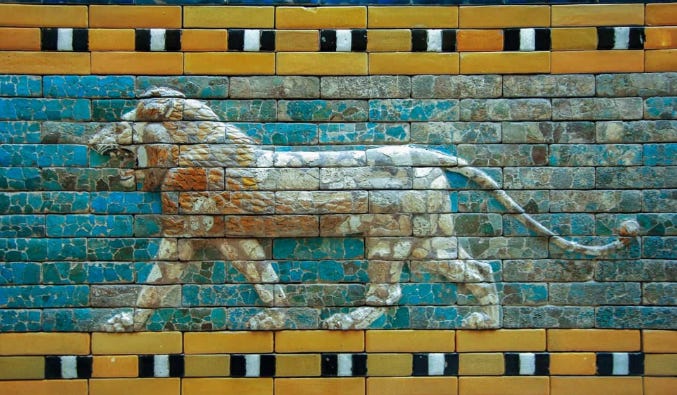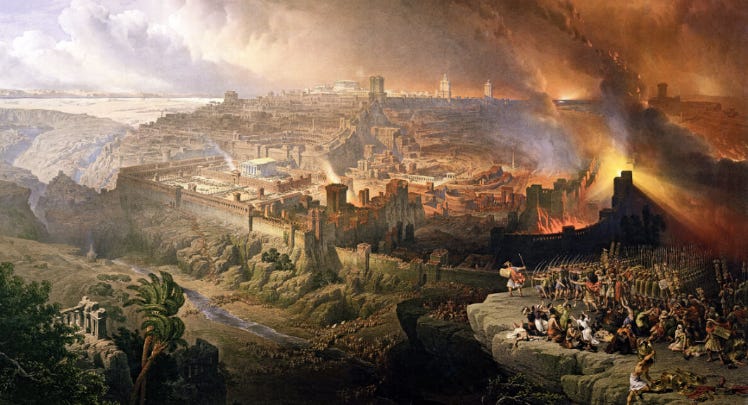The Covenant
If you will indeed obey My voice and keep My covenant, then you shall be My own possession among all the peoples. - Exodus 19:5
This week we're taking a closer look at the foundation for all Biblical prophecy: God's covenant with Israel.
Descending onto Mount Sinai in the midst of thunder, lightning, earthquake, and the sound of a great trumpet, God entered into covenant with the newly born nation of promise, swearing that He would fulfill His oath made 400 years earlier to bring the descendants of Abraham into the promised land.1
But here at Sinai, a new element unfolds. God's Law. And if Israel was faithful to follow it, God would allow them to live safely in the land under His protection. But if they were unfaithful, they would be subject to the punishments listed in the covenant.2
Then he took the book of the covenant and read it in the hearing of the people; and they said, “All that the Lord has spoken we will do, and we will be obedient!” - Exodus 24:7
The Book of the Law records these punishments, or curses as they're called, in painstaking detail. Breaking the covenant would result in famine, pestilence, military invasion, destruction of the temple, and ultimately, exile.
But it shall come about, if you do not obey the Lord your God… that all these curses will come upon you and overtake you. - Deuteronomy 28:15
These punishments were designed by God in such a way as to draw the Gentile nation’s attention to His covenant.3 It would not be long before they would witness the covenant curses play out on the world stage.
By the rivers of Babylon, there we sat down and wept, when we remembered Zion. - Psalm 137:1
For generations, God patiently endured Israel's apostasy, sending His prophets to remind them of their covenantal responsibilities. But now, true to His Word, the curses of the covenant would be invoked.
When I break your staff of bread… you will eat and not be satisfied.
In the years leading up to 586 BC, the Babylonian army had encamped around Jerusalem, cutting off all supply of food and water. This was a strategy used by invading armies to weaken an enemy before the final assault.
I will send pestilence among you, so that you shall be delivered into enemy hands…
The resulting famine would lead to malnutrition, disease, and starvation. The utter distress of the siege and ensuing famine is described in graphic detail in the lamentations of Jeremiah.4
I will also bring upon you a sword which will execute vengeance for the covenant…
Finally, the Babylonian invaders broke through the walls, where they found a small remnant of survivors. As was the custom, they took the most educated and able bodied back to Babylon as captives, while the rest were executed.
I will lay waste your cities as well and will make your sanctuaries desolate…
The aftermath of the invasion consisted of the usual pillaging and plundering of the day. With the support of the Edomites, Jerusalem was destroyed and the Jewish temple burned to the ground.5
Nevertheless, I will remember My covenant with you in the days of your youth… - Ezekiel 16:60
Despite Israel’s covenantal infidelity, God never reneged on His unconditional oath to Abraham.6 In 539 BC, king Cyrus of Persia issued a decree allowing the Jewish refugees to return home to rebuild Jerusalem and their temple.7
But the tension between God's unconditional promise to Abraham and the conditional terms of His covenant with Israel would continue. Until Israel could secure eternal righteousness, they would not be able to enjoy lasting tenure in the land, and the cycle of covenant curses would remain in play.
Truly I say to you, not one stone here will be left upon another, which will not be torn down. - Matthew 24:2
Fast forward to the first century and the advent of Jesus Christ, the Lord's Anointed. While Jesus gained many followers in Israel, the nation as a whole rejected Him, ultimately having Him crucified. And if breaking the covenant invoked such severe consequences, the offense of crucifying the Messiah would surely not be dismissed by God.
Therefore He will give them up until the time when she who is in labor has borne a child. - Micah 5:3
In 70 AD, roughly forty years after Jesus’ crucifixion, Jerusalem would once again find herself under siege, this time by Roman legions. The Jewish historian Flavius Josephus, who was an eyewitness to the siege, recorded the horrors of the assault on the Judean capital in War of the Jews.8
And when they were come to the houses to plunder them, they found in them entire families of dead men… that is of such as died by the famine. - Josephus
In a mirror image of the Babylonian assault, every single curse would once again be invoked, complete with the destruction of the Jewish temple and exile to the nations. But while the first exile to Babylon was a mere seventy years,9 this global exile would last for over eighteen centuries, when God would once again miraculously restore Israel to their land.10
The Deliverer will come from Zion, He will remove ungodliness from Jacob. “This is My covenant with them, when I take away their sins.” - Romans 11:26-27
Those familiar with eschatology are aware that the years leading up to the return of Jesus are characterized by an unparalleled time of trouble for the nations, specifically centered around an invasion of Jerusalem and destruction of the Jewish temple.11
Alas! For that day is great… it is the time of Jacob’s trouble, but he will be saved from it. - Jeremiah 30:7
It is through this final travail that Israel is brought to the end of her strength and made ready to welcome her Messiah, Jesus of Nazareth, as He descends on the clouds in the midst of thunder, lightning, earthquake, and the sound of a great trumpet.12
This is no arbitrary ending to the story of redemption. All Biblical prophecy revolves around God’s covenant with the nation of Israel.
Exodus 19:16-20 & 24:1-8, Genesis 15:18 & 17:7
Deuteronomy 28:1-68, Leviticus 26:1-39
Deuteronomy 29:24-25, Jeremiah 22:8-9, Ezekiel 39:23
Lamentations 4:1-11
Ezra 5:12, 2nd Kings 25:9, Psalm 137:7, Amos 1:11
Leviticus 26:42-45, Deuteronomy 4:31, Psalm 105:8-11 & 106:44-45, Ezekiel 16:60
2nd Chronicles 36:22-23, Ezra 1:1-4, Isaiah 44:28
https://www.pbs.org/wgbh/pages/frontline/shows/religion/maps/primary/josephussack.html & http://www.eyewitnesstohistory.com/jewishtemple.htm
Jeremiah 25:11-12 & 29:10
Hosea 3:4-5 & 5:15, Isaiah 61:4, Micah 5:3
Ezekiel 38:8-12, Daniel 8:11, 9:27 & 11:31, Zechariah 12:2-3 & 14:1-2, Matthew 24:15-21, 2nd Thessalonians 2:1-5
Matthew 23:39 & 24:29-31, Isaiah 66:15, 1st Thessalonians 4:16, Joel 2:1-2, Zephaniah 1:14-16, Revelation 11:19









